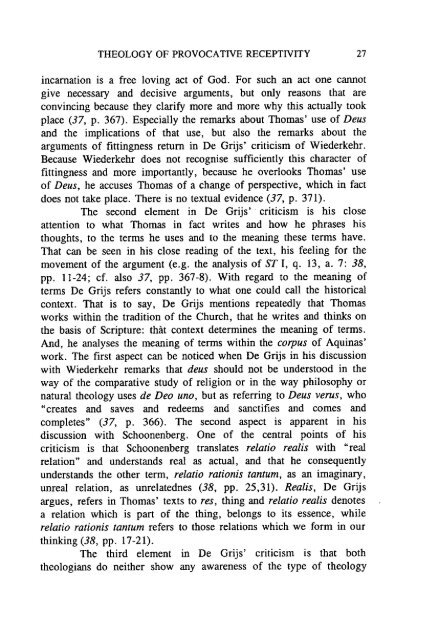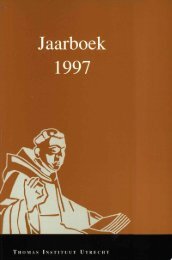Jaarboek Thomas Instituut 1995 - Thomas Instituut te Utrecht
Jaarboek Thomas Instituut 1995 - Thomas Instituut te Utrecht
Jaarboek Thomas Instituut 1995 - Thomas Instituut te Utrecht
You also want an ePaper? Increase the reach of your titles
YUMPU automatically turns print PDFs into web optimized ePapers that Google loves.
THEOLOGY OF PROVOCATIVE RECEPTIVITY 27<br />
incarnation is a free loving act of God. For such an act one cannot<br />
give necessary and decisive arguments, but only reasons that are<br />
convincing because they clarify more and more why this actually took<br />
place (37, p. 367). Especially the remarks about <strong>Thomas</strong>' use of Deus<br />
and the implications of that use, but also the remarks about the<br />
arguments of fittingness return in De Grijs' criticism of Wiederkehr.<br />
Because Wiederkehr does not recognise sufficiently this charac<strong>te</strong>r of<br />
fittingness and more importantly, because he overlooks <strong>Thomas</strong>' use<br />
of Deus, he accuses <strong>Thomas</strong> of a change of perspective, which in fact<br />
does not take place. There is no <strong>te</strong>xtual evidence (37, p. 371).<br />
The second element in De Grijs' criticism is his close<br />
at<strong>te</strong>ntion to what <strong>Thomas</strong> in fact wri<strong>te</strong>s and how he phrases his<br />
thoughts, to the <strong>te</strong>rms he uses and to the meaning these <strong>te</strong>rms have.<br />
That can be seen in his close reading of the <strong>te</strong>xt, his feeling for the<br />
movement of the argument (e.g. the analysis of ST I, q. 13, a. 7: 38,<br />
pp. 11-24; cf. also 37, pp. 367-8). With regard to the meaning of<br />
<strong>te</strong>rms De Grijs refers constantly to what one could call the historical<br />
con<strong>te</strong>xt. That is to say, De Grijs mentions repea<strong>te</strong>dly that <strong>Thomas</strong><br />
works within the tradition of the Church, that he wri<strong>te</strong>s and thinks on<br />
the basis of Scripture: thàt con<strong>te</strong>xt de<strong>te</strong>rmines the meaning of <strong>te</strong>rms.<br />
And, he analyses the meaning of <strong>te</strong>rms within the corpus of Aquinas'<br />
work. The first aspect can be noticed when De Grijs in his discussion<br />
with Wiederkehr remarks that deus should not be understood in the<br />
way of the comparative study of religion or in the way philosophy or<br />
natural theology uses de Deo uno, but as referring to Deus verus, who<br />
"crea<strong>te</strong>s and saves and redeems and sanctifies and comes and<br />
comple<strong>te</strong>s" (37, p. 366). The second aspect is apparent in his<br />
discussion with Schoonenberg. One of the central points of his<br />
criticism is that Schoonenberg transla<strong>te</strong>s relatio realis with "real<br />
relation" and understands real as actual, and that he consequently<br />
understands the other <strong>te</strong>rm, relatio rationis tantum, as an imaginary,<br />
unreal relation, as unrela<strong>te</strong>dnes (38, pp. 25,31). Realis, De Grijs<br />
argues, refers in <strong>Thomas</strong>' <strong>te</strong>xts to res, thing and relatio realis deno<strong>te</strong>s<br />
a relation which is part of the thing, belongs to its essence, while<br />
relatio rationis tantum refers to those relations which we form in our<br />
thinking (38, pp. 17-21).<br />
The third element in De Grijs' criticism is that both<br />
theologians do neither show any awareness of the type of theology








